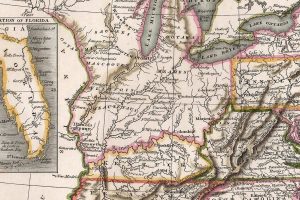I was lying in bed at 3:30 a.m. a couple of weeks ago recounting dumb things I’ve done and making a to-do list when a new thought slipped into line.
It was this: I was warm and dry, fed and watered. I did not fear a knock at my door and a one-way trip to jail. Since I have a long and undistinguished record of hostility to power in many forms, maybe I’m just too old to bother with anymore.
Had I been born in most other countries, I would probably have found myself as a left-wing opponent of a right-wing dictatorship or a right-wing opponent of a left-wing dictatorship. My fate would have been the same unpleasantness in either case.
I’ve had a long, blemished tussle with authority acting arbitrarily. I attribute this to poor breeding and too much early Bob Dylan on my part along with bad rulings by bad rulers on authority’s part.
So why was I feeling pretty safe in my own mortgaged home on my own mortgaged land?
One reason, of course, is that America has managed to muddle through for more than two centuries without either turning toward dictatorship or allowing a dictator to take over. Our generals don’t seize power.
The other reason is that we have fought several necessary wars to defend our land and our muddling ways. The best example is WW II.
Had Imperial Japan and Nazi Germany occupied the United States in 1945 instead of the other way around, Americans would have been shipped off, “disappeared” and killed by the millions. This was Japan’s pattern in China and Southeast Asia, and it was the Nazi way in every occupied territory. Both regimes believed they had the right to take lands and enslave their inhabitants.
WW II was a fight over lands and the ideas that would run them. Both dictatorships wanted more land and resources for their people, and less for others. The desire to exploit the lands of others motivated both regimes.
Control of land and resources is a root cause of most wars—ideology is often more the rationale du jour. Land is the motivation common to every leader wanting to extend control from Alexander, Caesar and Attila to Jefferson, Polk, Hitler and Stalin.
When Americans have defended our land, it has brought out the best in us. We’ve succeeded in that defense, which allows most of us to sleep without fear of political arrest, imprisonment without trial and execution at a mass grave.
When we acquired land through conquest or manipulation, ends were used to rationalize means. Most of these episodes don’t shine, no matter how hard they’re polished.
WW II gave the people of America, some of its allies, all of its main enemies and a number of bystanders the freedom to sleep without fear. Reasonable people can agree to disagree on whether all the undeclared wars and interventions we’ve undertaken since 1945 have similarly protected our slumber.
My father-in-law was drafted in the early 1940s. Because he is very smart, the Army first assigned him to working with cameras in P-38s and then to the 74th Signal Company (Special), which was attached to various divisions.
One of his jobs as an officer was to go in with the first wave in amphibious assaults to set up communications along the beaches. He did this four times—Sicily, Salerno, Anzio and Saint-Tropez in southern France. Four D-Days. The fighting in Italy — up one fortified mountain after another — was as bad and as disheartening as it got.
He’s carried the cost of defending our land for more than 60 years. He paid, and I benefited—is how I figure it.
Last weekend, Melissa and I talked with him about this. He called his memories, “war stories.” But they were also purchases: This amount of horror buys this amount of sleep without fear.
I thanked him for what he did, for what he went through.
I think this thanking business is important to do. It has to be personal. I hope it means something a little different than another marble memorial.
He said he had been thanked only twice before.
Veterans of the Vietnam War were not thanked for serving by people like me who thought the Johnson-Nixon policies were wrong. They should have been, particularly by people like me. It was the policies I thought bad, not the soldiers in the field.
Less than a year before Pear Harbor, FDR in his January, 1941 State of the Union Address said that we “looked forward to a world founded upon four essential human freedoms” – freedom of speech and expression, freedom of religion, freedom from want and freedom from fear – “everywhere in the world.”
He didn’t say America was obligated to bring those freedoms to everyone everywhere. He said those principles were the four corners of a better deal for everyone everywhere.
Defending our own land and those Four Freedoms from genuine threat has united us. Our efforts to bring them to others through military interventions have sometimes improved lives and sometimes not.
It bothers me that half of the people in the world sleep in fear. But my more immediate — and selfish — concern is what we would lose here in the effort to make the world safe for the Four Freedoms everywhere.
Many empires have wanted to be global; none ever succeeded. Nations, like cats, can’t be herded in one direction–even a good one.
I often hear, “Freedom is not free.” It’s a truth that is cheapened when, like a bullet-proof vest, it’s slipped on to protect every use of American military force abroad since WW II, no matter how badly conceived.
Freedom’s price is too high to be paid here and there, everywhere and anywhere– just to pay it. We must get something really important for ourselves when we pay.
Our songs sing of land and our way. The land of the free. Sweet land of liberty. This land is your land, this land is my land. From sea to shining sea.
That’s what WW II paid for, what’s worth paying for.
This thanking business remains on my to-do list.
This content may not be used or reproduced in any manner whatsoever, in part or in whole, without written permission of LANDTHINK. Use of this content without permission is a violation of federal copyright law. The articles, posts, comments, opinions and information provided by LANDTHINK are for informational and research purposes only and DOES NOT substitute or coincide with the advice of an attorney, accountant, real estate broker or any other licensed real estate professional. LANDTHINK strongly advises visitors and readers to seek their own professional guidance and advice related to buying, investing in or selling real estate.









You are so right about this “thanking” stuff. I frequently think of this when I attend church. I am able to attend the church of my choice because of my father, uncles and others I don’t even know. They obtained this freedom for me. Today, there are others to thank, because they do stand in the gap for me to have this freedom. Thanks for your words.
Yes Curtis’
Only those who went through it, wil feel what you wrote.I was an eighteen year old high school boy when the Germans invaded the Netherlands and within one month of the occupation I got a severe beating from three German soldiers about a dispute of them walking in the middle of the street and not on the sidewalk as I said they should., in their own language(We studied English,French and German beside the Dutch language in High School). Five years later I saw the Canadian Army liberating our town and I caught myself having developed a conditioned response of fear for uniforms.I am not to tell you how I survived those five years of war,but let it to known that I understand what you wrote.